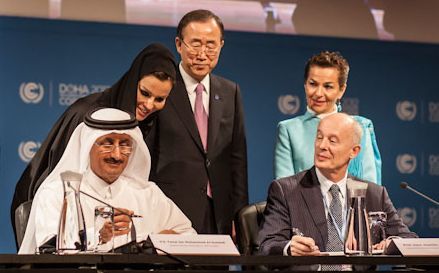The German government’s chief climate advisor is the furthest thing from an objective, dispassionate scientist. He thinks using fossil fuels amounts to “a lifestyle of mass destruction” – and that the UN should be put in charge of trillions of dollars.
According to his CV, Hans Joachim (John) Schellnhuber earned his PhD in theoretical physics in 1980 and spent the next eight years as a postdoctoral fellow, an assistant professor, and a visiting professor. In 1988 he landed a job as a full professor.
A mere three years later, in a precipitous departure from the usual academic career path, Schellnhuber founded (and became the director of) the Potsdam Institute for Climate Impact Research (PIK).
Twenty years on he continues to lead that organization. It now employs 340 people and received funding in 2011 from:
- Germany’s national government
- the German state of Brandenburg
- the European Regional Development Fund
- unnamed “external sources”
PIK’s existence is, of course, inextricably linked to the idea that there is a climate crisis. If the world decided tomorrow that global warming is a trivial concern the life of PIK’s director would change dramatically.
It’s unlikely, for example, that he would retain his 11-person staff. This includes the head of his office, two personal assistants, two personal executive advisors, two personal scientific advisors, a research analyst, a technical support person, and two student assistants. (See the group photo here.)
These days Schellnhuber appears to be rather pleased with himself. PIK’s website includes a portrait gallery featuring no less than 10 high-quality images of him looking solemn and thoughtful. His online CV helpfully lists the professional positions he was offered but chose to decline.
We’re advised that he is a member of the editorial boards of six scientific journals and that he has taught at a number of universities. But the bulk of Schellnhuber’s time isn’t spent in a physics lab. Rather, for at least two decades, he has been an administrator, a bureaucrat, and a political advisor.
In 1992 the German government established the German Advisory Council on Global Change. Schellnhuber has been either its chairman or vice chair for most of its history. He is currently the leading climate advisor to German Chancellor Angela Merkel – whom he has known since at least 1995.
He heads the European Commission’s Global Change Advisory Group and the advisory board of the European Climate Foundation. He is a member of at least 11 other councils and boards, and has been involved for years with the Intergovernmental Panel on Climate Change (IPCC).
At the recent UN climate conference in Doha the world learned that Schellnhuber’s empire is expanding even further. PIK is establishing another climate research institute – located in, and funded by, the oil-rich nation of Qatar.
A photograph taken at a ceremonial signing of documents reveals that UN climate chief Christiana Figueres as well as UN Secretary-General Ban Ki-moon were on hand to applaud (see the top of this post).
In other words, Schellnhuber is no ordinary scientist. He is, instead, a political actor – a mover and shaker at the very highest levels of international politics.
His public pronouncements reflect this reality. Sticking to his own narrow field of scientific expertise is not what this man does. He doesn’t tread carefully, striving to avoid exaggeration. Rather, he is a full-blown activist – the kind who seems to forget that politicians are answerable to ordinary voters rather than to self-important experts.
For years, Schellnhuber’s public remarks have been filled with talk of “dangerous and catastrophic climate change,” tipping points, and predictions that 6 billion could perish if the climate overheats.
In 2003, he authored an article for the UK Guardian that characterized the use of fossil fuels as “a lifestyle of mass destruction.” He suggested that wealthy Westerners should feel guilty “for eco-crimes that sink distant island states” via an “SUV culture out of control.” In his view, the least we should do is establish “a UN supervised adaptation fund worth several trillion dollars.”
Despite the long list of pompous pronouncements in that Guardian piece, not once did Schellnhuber explain why his physics training gives him special insight into economic, social, or political questions.
In late 2009, he referred to the upcoming Copenhagen UN climate summit as “the most important meeting in the history of the human species.” Shortly afterward, he issued a dire warning: “This is the final scientific call for climate negotiators.”
Last month, ahead of the Doha UN climate talks, Schellnhuber complained to a news magazine that politicians weren’t taking his advice. “We’ve stressed time and again, that we need nothing less than a new industrial revolution,” he said. Another news story quoted him: “in ten years it will be too late.”
Schellnhuber’s over-the-top views were similarly on full display at a gala dinner in Doha. While delivering a keynote address, he uttered this inflammatory line: “First law of humanity – don’t kill your children.” The UN climate chief seconded the inanity by quoting him on Twitter.
Schellnhuber is the co-author of yet another article, published in 2010 in a respected journal, that discusses how scientific insights can be employed to “change human behaviour” and “influence political will.”
Let us be clear on this point: it is not the business of physicists to change human behaviour.
This man is a menace. Like Canada’s own David Suzuki, Schellnhuber thinks we should listen to him because he’s a scientist. But he sounds – and behaves – exactly like a politician.
Postscript:
When assessing Schellnhuber’s judgment it’s worth considering how he described the IPCC in a 2008 article published in the Proceedings of the National Academies of Science:
the monumental reports of the Intergovernmental Panel on Climate Change (IPCC) are the guideposts for both experts and stakeholders. The IPCC format, perfected by the late [IPCC chairman] Bert Bolin, is a painstaking self-interrogation process of the pertinent scientific community. In this process, virtually every stone in the cognitive landscape is turned and the findings, however mundane or ugly, are synthesized into encyclopedic accounts.
This description is so dramatically different from what was uncovered by the 2010 InterAcademy Council investigation, it’s difficult to believe the same organization is being discussed. The 2010 inquiry, remember, identified “significant shortcomings in each major step of the IPCC’s assessment process.”
IPCC insiders told investigators that many IPCC authors are appointed for political reasons. They said large numbers of their colleagues possess such weak scientific credentials they are incapable of making a meaningful contribution.
Insiders further reported that the IPCC has no quality assurance procedures – that IPCC authors simply assume that the journal that published a research paper has already verified its accuracy.
When Schellnhuber looks at the IPCC, he sees perfection. He sees a thoroughness that hundreds of other people say doesn’t exist. Hmmm.
An interesting discussion of what the Climategate emails say about Schellnhuber appears at the Bishop Hill blog here.
A Der Spiegel article, titled The Invention of the Two-Degree Target, describes the role Schellnhuber played in that business.






